#lyrics analysis
Text
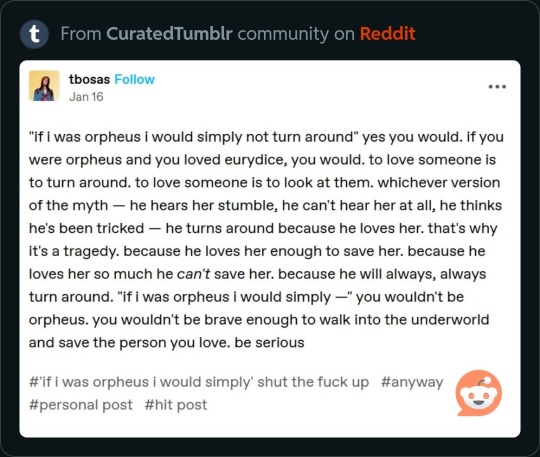
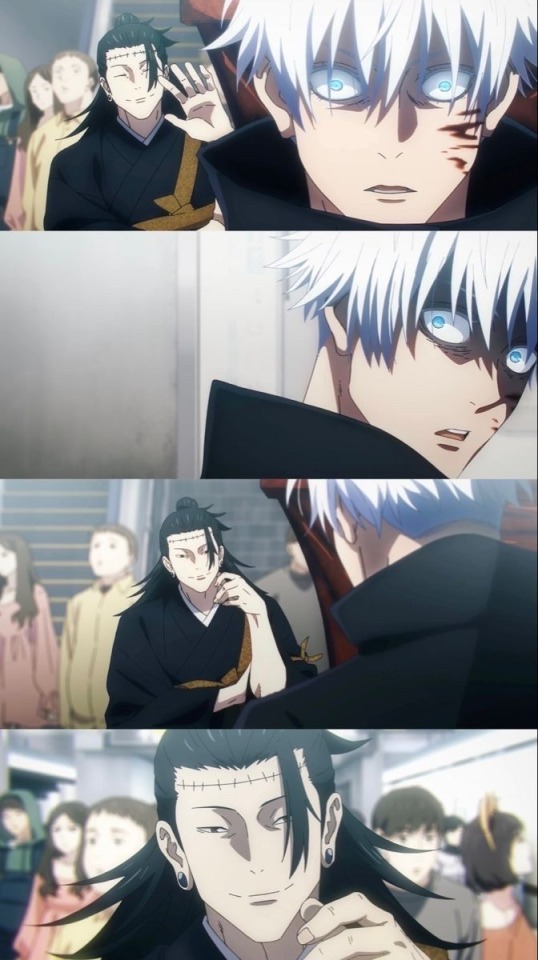

I'd be the voice that urged Orpheus
When her body was found (hey ya)
I'd be the choiceless hope in grief
That drove him underground (hey ya)
I'd be the dreadful need in the devotee
That made him turn around (hey ya)
And I'd be the immediate forgiveness
In Eurydice
Imagine being loved by me

Lyrics taken from “Talk” by Hozier
Art from the anime Jujutsu Kaisen
#jujutsu kaisen#jjk#geto suguru#gojo saturo#geto#gojo#satosugu#satosugu angst#stsg angst#jjk angst#hozier#hozier lyrics#orpheus#imagine being loved by me#love and grief#they are my roman empire#they deserved so much better#of course he turned around#my one and only#the only one I had#suguru#satoru#i love them#geto suguru obsessed#lyric posting#lyrics#lyrics analysis#anime and music#jujutsu kaisen anime#Spotify
43 notes
·
View notes
Text
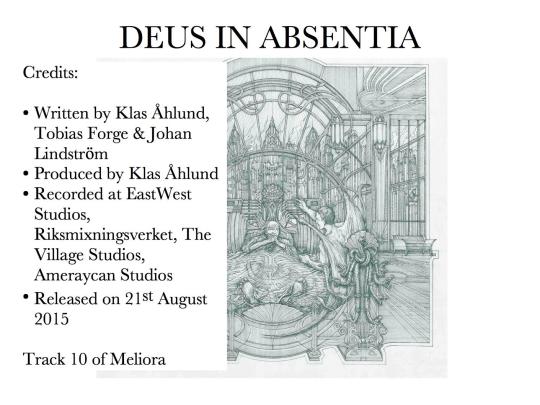

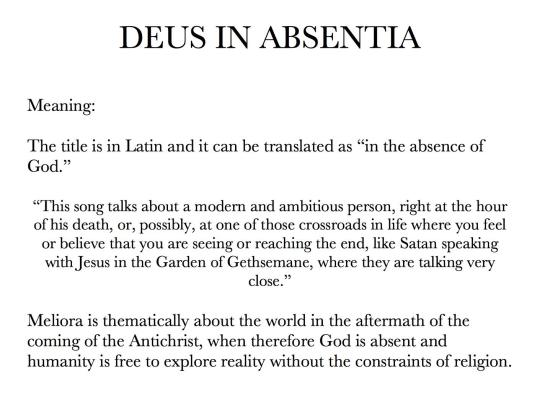
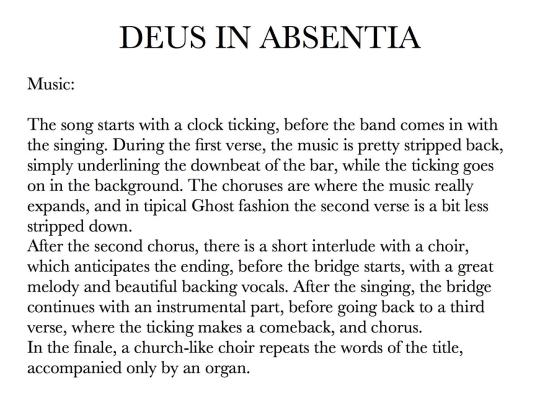
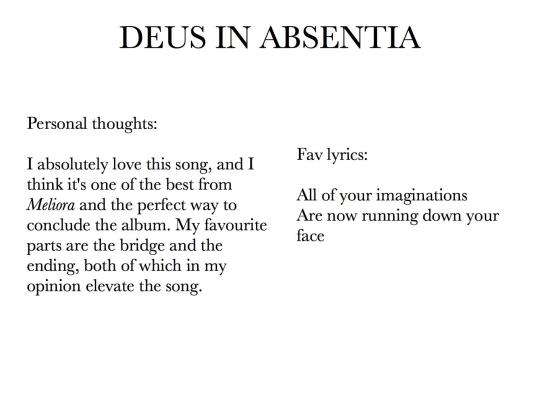
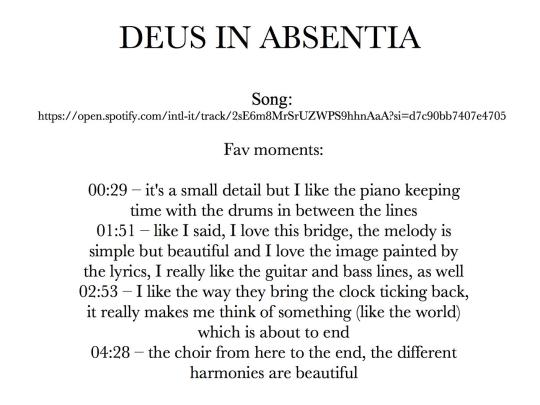

One of the most underrated songs from Meliora (and one of the best)
Links under the cut
youtube
#the ending choir is so good#THE BRIDGE#ghost songs database#deus in absentia#meliora#ghost band#the band ghost#ghost bc#ghost#papa emeritus#papa emeritus iii#papa emeritus 3#terzo#papa terzo#papa emeritus terzo#nameless ghouls#meliora era#song analysis#lyrics analysis#song recs#tobias forge#Youtube
54 notes
·
View notes
Text
Screaming from the crypt (or how the past haunts the present on Midnights)
I know it's been discussed so much since Midnights came out but just.
I love how there is such a clear narrative throughout the album (and perhaps especially on the 3am/Vault tracks). About questioning and regret and choices and coming to terms with all of it. It is one long story about how we're all a mosaic of the choices we make, each one taking something from us and leaving something else in its place.
(And now a disclaimer: I'm looking at this mostly through a narrator/subject lens, and trying not to dive too deeply into real-life events or speculation except for in a general sense. For this purpose I like to look at the body of work as art, like literature, because I find it makes it easier to see the common threads in the different songs and cohesion in the narrative.)
In looking at the 3am+ tracks in particular, it's fascinating how some turns of phrases or themes repeat themselves in different songs, in different contexts. (I'm only focusing on the non-standard tracks because there are too many songs and I'd be here all day but I bet I could do a part two lol.) I know many people have pointed out the parallels throughout her discography already and I’m not saying anything groundbreaking by writing this, but I love how these parallels run through in the same album, because it makes it seem like it's one long story, or at least, one long rumination on many different stories that are coalescing into a single narrative.
Battle (let’s go)
For instance, the one that jumped out at me when I started writing this post the other week was, "Tore your banners down, took the battle underground," in The Great War and "If clarity's in death, then why won't this die? Years of tearing down our banners, you and I," in Would've, Could've Should've. It's a story about staying stuck in the same cycle of reliving trauma and coping mechanisms and bad habits over and over again and fantasizing about how taking the “antagonist” out and gaining the upper hand for good would bring closure (WCS), but the truth is that nothing ever will. All that cycle does, though, is repeat itself in other situations, and in this case pushes someone away the narrator cares for (TGW). The difference is that the imagined battle in WCS is a two-way street in her mind (that is ultimately unwinnable because it was never a fair fight), but in TGW it's one-sided -- she's the one fighting dirty, taking shots, the way she'd been doing in her imagination (or nightmares) all these years. But the person in front of her isn't fighting back the way the person in her mind in WCS would, because their intentions are honourable instead of exploitative.
And that's paralleled in another pair of lyrics from the two songs, "And maybe it's the past talking, screaming from the crypt, telling me to punish you for things you never did," (in TGW) and "The tomb won't close, I fight with you in my sleep," (in WCS). In both cases, the funeral imagery makes it seem like this past event should be dead and buried in WCS, but it keeps rising from the dead, haunting her no matter what she does and in TGW, another (or perhaps the same?) tomb that won't close keeps unleashing new ways to hurt her and in turn the new person in her life. In other words, the trauma from the past continues to bleed into the present.
(Again from a literary point of view, I'm not saying the events of the two songs are linked IRL, but they're fascinating textual parallels on the album as a string of chapters, which is why Dear Reader is so compelling, but that's a whole other essay.)
To keep the battle motif going, there’s yet another parallel, this time between TGW’s "[You were a] soldier down on that icy ground, looked up at me with honor and truth," and You’re Losing Me’s "All I did was bleed as I tried to be the bravest soldier, fighting in only your army.” In the former, the subject is laying down his armour in the war she’s projecting onto him, waving the white flag, and she realizes that she’s about to destroy something if she doesn’t put her sword down too. By the time we get to YLM, the roles are almost reversed; at the very least they’re supposed to be on the same team, but in this case she’s doing all the heavy lifting, fighting for their relationship in contrast to his apathy killing it. It’s also pretty interesting (if not outright intentional) that one of the 3am+ editions of the albums starts with The Great War, where they find themselves in conflict (even if it’s in her head) that ends in a truce, and ends with You’re Losing Me signalling the end of the relationship, evidence that the resolution in the first song wasn’t an ending but merely a ceasefire before the last battle.
Putting the rest under a cut because this is waaaaay too long now ⤵️
(There’s also another metaphor there in The Great War with its battle imagery: World War I, aka The Great War, was supposed to be the war to end all wars, because loss on its scale was never seen before and when it ended, most thought never again would the world embroil itself in such battle, the horrors and implications were so devastating. Two decades later, the world found itself in WWII, with an even larger scope and more horrific consequences, the intervening time between the two a period of festering conflicts and resentment leading to some of the worst acts the world would see. Bringing real life into it for a second, there’s something a little poetic, though sad, about The Great War the song being about a fight that could have ended the relationship that they ultimately resolved and was meant to be evidence of the strength of their love, but so too did it end up being a period of détente, the greater battle coming for them years later. But that is not the point of this post.)
If one thing had been different
Another major theme in these editions is pondering the "what ifs?" of life, but I think it takes on even more significance in the broader context of the album in the lyrics of "I'm never gonna meet what could've been, would've been, should've been you," in Bigger than the Whole Sky and the repetition of would've/could've in Would've, Could've, Should've (I would've looked away at the first glance, I would've stayed on my knees, I would've gone along with the righteous, I could've gone on as I was, would've could've should've if I'd only played it safe, etc.) In both songs, the narrator is mourning an alternate course their life could have taken* and questioning what they could have done differently, in the aftermath of trauma and loss, and the regret that comes with that loss, and with the loss of agency in the situation because ultimately it was never in their hands. In an album full of questions, wondering about the path not taken, or the forks in the road that have led to a different version of your life, it's digging deeper into the contrast of choice vs. fate, action vs. reaction, dwelling on the past vs. moving on. When you're supposed to let go of the past, what do you do when it is holding your future hostage?
(*I know there are different interpretations/speculation about BTTWS which I am not getting into on main. I'm just saying that whatever the song is about, it's grieving something that never came to be. The literal origin of the song is less important to the album than the sense of loss it portrays. Whatever the inspiration is, it's crafted to tell part of the story of Midnights of ruminating over how, to borrow from her previous work, if one thing had been different, would everything be different?)
(Also I was today years old when I realized that the words are inverted in the two songs. Apparently I've been hearing BTTWS wrong this whole time.)
There's also an interesting tangent in the role of faith in both songs: in WCS, the events of the story cause her to lose her faith (e.g. "All I used to do was pray," "you're a crisis of my faith,") and question all the things she felt had been unquestionable until that point in her life (e.g. "I could have gone along with the righteous"), whereas in BTTWS, she questions whether that very lack of faith is to blame for the loss in that song ("did some force take you because I didn't pray? [...] It's not meant to be, so I'll say words I don't believe"). It's like pinpointing the moment her life changed and upended her beliefs (WCS), but as a result then leaving her unmoored in times of crisis because ultimately there's no explanation or comfort to be taken from what she used to hold true before that (BTTWS). The words she once relied upon to guide her have long since lost their meaning, but in times of trouble it leaves her wondering if that faith she once held then lost could have prevented this pain.
(Shoutout to WCS for being Catholic guilt personified lol.)
To keep on with the vaguely faith-y notions, an obvious parallel is the line in Would’ve Could’ve Should’ve about, “I damn sure never would've danced with the devil at nineteen,” and, "When you aim at the devil, make sure you don't miss," in Dear Reader. All of WCS is about her fighting with an antagonist who haunts her, with whom she wholly regrets ever becoming involved. DR could be seen as a reflection on that fall from grace, warning the audience that if you choose to go after the person (or thing) haunting you, make sure you do so clearheaded enough to be decisive. Again, these “devils” may not be related in real life: the IRL devil in DR could be speaking about her naysayers, or Kim*ye, or Scott & Scooter B, etc., meaning not to cross your enemies until you know you can win. But taking real life out of it and looking at it textually, I am intrigued by the link between WCS and DR, so that’s what I’m going with here. And perhaps that’s even the point in a wider sense; there will be multiple “devils” in your life, or threats to your well-being. If you’re going to commit to taking them down — whether it’s an actual person, or the demons inside you that refuse to let you go — make sure you have the right ammo so that they can no longer hurt you. (Of course, one lesson from these experiences is that sometimes you can’t win, and you have to live with the fallout.)
(Sidebar: I know that “dancing with the devil” is a turn of phrase that means being led into temptation and engaging in risky behaviour, as opposed to describing the actual person. Given the religious metaphors in the song, that could very well be/is the intention, particularly when it’s preceded by, “I would have stayed on my knees” as in she would have continued to follow her faith — in whatever sense that means — had she never met this person, which could also be a more eloquent way of saying she would have continued to be live her life in a way that was righteous (even naive) and seen the world in black and white. Either way, it’s a force she wholly rejects. Like I said, multiple devils, same fight.)
Regret comes up too: in WCS, she says, "I regret you all the time," obviously directed at the person who manipulated her and led to her perceived downfall, citing him as the one impulse she wished she'd never followed, because it won't leave her no matter how hard she’s tried. In High Infidelity, she tells the person to, "put on your records and regret me," and on the surface, it’s like she’s turning the tables, painting herself as the one now causing the regret in someone else, the one inflicting the pain this time. Yet the verse preceding it and the lines following it in the chorus depict a partner who is also emotionally manipulative and vindictive like in WCS (“you said I was freeloading, I didn’t know you were keeping count,” “put on your headphones and burn my city,”). It’s not so much that she’s intentionally harming the person (the way the person in WCS does to her), but rather that the venom in the subject’s feelings towards her seeps through; she’s imagining the way he’s going to feel about her when she leaves, hating her just for by being who she is. (There could be another tangent about how in both songs she’s there to be a “token” in a game for both of the men, who play her for their own purposes.) The regret is dripping with disdain. It’s as though she’s picturing how the person is going to hate her for doing what she’s thinking of doing the way she hates the person who first hurt her.
Sadness, unsurprisingly, shows up in a few lyrics. In BTTWS, “Everything I touch becomes sick with sadness,” sets the scene of a person so overcome with grief that it permeates everything around them; they cannot see their way out of it and feel like the fog will never lift. In Hits Different, it’s, “My sadness is contagious,” the result of a breakup where the person’s grief again touches everything and everyone around them, pushing them further in their despair and loneliness. The reason behind the grief in either case may vary, but regardless of the source, the feeling is overpowering and isolating. They may be different chapters in the story, but the devastation is hauntingly familiar. (As is a recurring theme in Midnights as a whole: there are situations and feelings that present themselves at different points in her journey and colour in the lines in different ways along the road. Like revisiting an old vice and realizing the hit isn’t quite the same as it was in the past.)
Death by a thousand cuts
She also writes about wounds on this album, which isn't surprising I suppose given that the whole conceit is that these are things that have kept her up at night over the years. WCS is perhaps the driving narrative on this never ending hurt when she sings, “The wound won't close, I keep on waiting for a sign, I regret you all the time,” suggesting that no matter what she does, the pain of this experience has permeated everything she’s done afterwards. (Not unlike the overwhelming grief in BTTWS, for instance.) Elsewhere, in High Infidelity she sings, "Lock broken, slur spoken, wound open, game token," and in Hits Different, "Make it make some sense why the wound is still bleeding.” Again I'm not suggesting they're about the same events; the line in HI is about a situation where a partner crosses a boundary, hits below the belt, picks at an insecurity (or creates a new one) and treats the relationship like it's transactional, opening the floodgates in turn. In HD, the wound seems to be more self-inflicted, where she's pushed the person away. (Over a situation real or imagined she feels she needs distance from.) But again, something has picked at her like a raw nerve, and just like in the past, she's hurting, even in a different time and place and person. Almost like the wounds of the past break open over and over again to create new scars. If one were to extrapolate further, it wouldn’t be the biggest leap to wonder if the wound open in WCS, then torn apart in HI makes the one in HD hurt even more.
(I once wrote a post about how I think as time goes on, WCS is going to turn into one of those songs that will be found to drive so much of her work, because it’s just… kind of the unsaid thesis statement of so much of her songwriting.)
Another repeated theme is that of the empty home and loneliness. In High Infidelity, she sings, "At the house lonely, good money I'd pay if you just know me, seemed like the right thing at the time," painting a picture of someone who may have everything they'd want to the outside world, but in reality feels metaphorically trapped in their home (or at least alone amidst abundance), a symbol of a relationship gone sour and a failure to build connection. She just wants someone to understand her, want her for her, but as she's written earlier in the song, she's just a pawn in the game, a trophy from the hunt. Home, in this case, is lonely, isolated, an emblem of her fears. In Dear Reader, she continues this thread, then singing, "You wouldn't take my word for it if you knew who was talking, if you knew where I was walking, to a house not a home, all alone 'cause nobody's there, where I pace in my pen and my friends found friends who care, no one sees you lose when you're playing solitaire." It's the same idea, admitting to listeners that the gilded cage she lived in kept her distanced from her loved ones and real connection, keeping her struggles close to the vest but feeling desperately lonely amidst her crowning success. She's pushed people away and it may have felt like the right thing at the time, but in the end maybe felt like she was trapped. And when you push people away, eventually they take you at your word and stop pushing back; you’re a victim of your own success at isolating yourself. What starts out of self-preservation then further perpetuates the underlying problems.
(There's another interesting link about "home" also feeling unsafe with HI's "Your picket fence is sharp as knives," which further leads into the theme of marriage/domesticity feeling dangerous, which is a whole other thing I won't get into here because it's another discussion and may derail this already gargantuan word salad.)
In a slightly similar vein, we have the metaphor of bad weather for a rocky road or unstable relationship, in High Infidelity again with, "Storm coming, good husband, bad omen, dragged my feet right down the aisle" and You’re Losing Me’s "every morning I glared at you with storms in my eyes.” They aren’t speaking of the same situation or even same kind of breakdown, but it is pretty interesting how the idea of clouds/storms/floods/etc. play such a role in Taylor’s music to signal depression, apprehension, fear, uncertainty, etc. In HI, I think the “storm” coming is the looming threat of commitment to a partner who makes the narrator uneasy (if not fearful). In this case, the idea of making a life with this person is not one that incites joy or comfort, but instead makes the narrator feel that dark times are ahead if she continues down this path. Perhaps in some way, the “storms” in YLM have made good on the threat in HI in a different way; it’s a different home, a different relationship, but the clouds have settled in regardless, and some of her fears have come to fruition in ways she did not expect. The person she once trusted no longer sees her or her struggles (or worse, doesn’t care), and the resentment and pain build with each passing day.
Coming back to heartbreak, one of the obvious "full circle" moments is the beginning of a relationship in Paris, where she says that, "I'm so in love that I might stop breathing," clearly enthralled in a new love that allows her to shut the world out and grow in private, capturing the all-encompassing nature of the relationship. This infatuation has consumed her in the most wonderful way (in contrast to the sorrow of some of the previous songs), and it feels like a life-altering (or even life-sustaining?) force that is so strong she may forget what it’s like to breathe. (Metaphorically speaking, of course.) By the end of the album, though, in You're Losing Me, that heart-stopping love has become a threat: "my heart won't start anymore for you." In the former, her racing heart is full of excitement, but by the latter, her heart has given out completely under the weight of the pain she bears. (YLM is full of death/illness imagery which I already wrote about awhile ago so I won't hear, but needless to say that song deserves its own essay for so many reasons.) She's gone from the unbridled joy of the beginnings of a relationship to the unrelenting sorrow of its end, two sides of the same coin.
Love as death appears elsewhere in the music too, for instance, in High Infidelity’s, “You know there's many different ways that you can kill the one you love, the slowest way is never loving them enough" and You’re Losing Me’s “How can you say that you love someone you can't tell is dying? […] My face was gray, but you wouldn't admit that we were sick.” Though not completely analogous situations, they both tell the tale of one partner’s apathy (or at least denial) destroying the other. In the former, the partner’s actions (or inaction) are more insidious, if not sinister; in the latter, the lack of momentum (or admission of a problem) is passive. In both cases, the end result is the narrator’s demise; it’s a drawn out affair that chips away at her morale and her health and her sense of self. (Breaking my own rule about bringing in alleged actual events into the discussion, but the idea that the relationship in High Infidelity, which was obviously fraught with unease and even fear, ended in a similarly excruciatingly slow and hurtful death by a thousand cuts as the relationship in You’re Losing Me almost did at that time must have been so painful. It almost feels like YLM is wondering why what used to be a source of light in her life was mirroring a situation that caused her such pain in the past.)
From the same little breaks in your soul
I said early on that part of what is so compelling about Midnights is that it feels like an album about ruminating — on choices, on events, on people — and the two final “bonus” tracks of the album depict that as well. In Hits Different, she sings that, “they say if it’s right, you know,” an ode to the confusion of a breakup and struggling with the aftermath of calling it quits. It’s a line that has always intrigued me, because the typical use of the phrase is in the sense of, “you’ll know when you meet the one,” but here it seems to have a double meaning, a reassurance perhaps from the friends (who later on tell her that "love is a lie") that she’ll know if she’s made the right decision in calling it off, but could also be her wondering if the relationship is right, she’ll know, and want to reconcile. In the final bonus track, You’re Losing Me, she sings, “now I just sit in the dark and wonder if it’s time,” this time leaving no doubt about the dilemma she faces, though it’s no less fraught. She’s wondering, perhaps for the last time, if now is finally the moment to end the relationship for good. They say that if it’s right she’ll know, and now she’s wondering if that feeling inside her (that once told her her partner was the one, which is why it hit differently), is telling her that it’s time to go for good. Wait Alexa play “It’s Time To Go.” These are not only the things that keep her up at night, but the things that play over in her mind like a film reel in her waking hours.
Midnights as a whole is a deeply personal album, as is most of Taylor's work, but the 3am+ edition tracks seem to dig even deeper to a lot of the issues raised on the standard album. Almost like the standard tracks are the things she wonders about on sleepless nights, but the bonus tracks are the things that haunt her in the aftermath. The regret, anger, sadness, grief, relief, even joy— they’re the price she pays for the memories she keeps reliving. Midnights might be the most cohesive narrative of all her albums, and really does feel like we’re watching someone work through her journal over time, stopping short of outright naming those giant fears and intrusive thoughts (except for when she does) but making them plain as day when you connect the songs together, and perhaps never more clearly than in the expanded album. It’s incredible how the songs stand on their own to relay a specific moment in time, but that they are also self-referential to each other (whether thematically or overtly) to weave a larger web over the entire work. We’re so lucky as fans to have these stories and to keep peeling back these layers as time passes. (And my literature-analysis-loving ass loves her even more for it.)
This is obviously by no means an exhaustive list, and I know there are more parallels and probably even stronger links (particularly when you add the standard version into the mix), but these were the ones that particularly struck me and I’m just glad I’ve had a chance to sit with this and think it through. ❤️
#writing letters addressed to the fire#me thinking too hard about taylor lyrics#taylor swift#midnights#long post#lyrics analysis#song parallels#Gabby this one is for you friend <3#here goes nothing#Happy Friday or something idk!#(also i know i said there are things i wouldn’t discuss on main but my dms are open lol)#this is not as structured or well plotted out as I wanted it to be#and turned out to be more stream of consciousness than legit essay#but whatever at least i got my thoughts out there and it can release some plot of land in my brain for other stuff to think over lol#If anyone ever reads this thank you! And I’m sorry?#The best compliment i ever got in school#was when we were doing an analysis of a poem in English lit in college#And i brought something up casually#and my prof went ‘I’ve been teaching this class for eight years and that’s the first time anyone’s ever brought it up like that’#’and that just blew my mind’#and i was like ‘who me?’#so that’s all you need to know about me lol#Midnights: The Great War#Bigger than the whole sky#bttws#Midnights: Paris#Midnights: high infidelity#would’ve could’ve should’ve#Midnights: dear reader#midnights: bigger than the whole sky
71 notes
·
View notes
Text
The moon will sing by The Crane Wives is so Merthur coded from Merlin’s pov
“The moon will sing a song for me, I loved you like the sun. Bore the shadows that you made with no light of my own. I shine only with the light you gave me”
It’s Merlin and his view of only using his magic for Arthur but Arthur doesn’t know so can’t give him the light he needs to fully embrace all that he can be!
And even worse is the moon isn’t even Merlin. The moon is all the people who look up to him to return magic to the land while he’s just trying to survive.
Merlin isn’t the moon, he’s just a man who’s trying his best while he’s got an overgrown basement lizard harping down his ear about destiny and his role and his responsibility to protect a man who can never truly know him.
“Tell me once again, I could have been anyone, anyone else. Before you made the choice for me”
And you’re gonna tell me this isn’t Merlin’s song about the love and devotion he feels for Arthur?
No one can change my mind about this.
#bbc merlin#merthur#merlin#merlin emrys#arthur pendragon#the crane wives#music#merlin bbc#lyrics analysis#the moon will sing#lyrics#kilgharrah hate club
49 notes
·
View notes
Text
Let's Talk Innuendos and Queer Subtext: TXT's Poppin' Star Lyrics Analysis
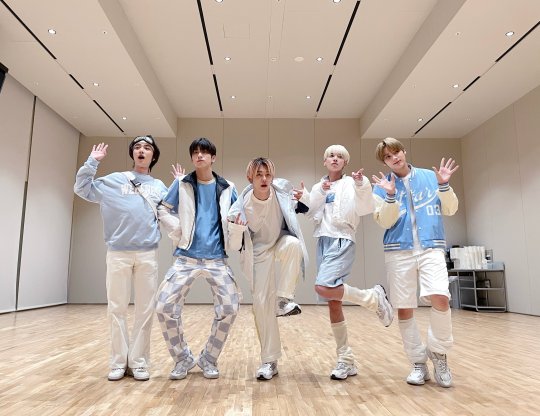
One of the joys of making progress in my Korean language journey has been the ability to analyze lyrics more critically by dissecting tone, word choice, or rhyme schemes that would have otherwise slipped by me a few years ago. And as someone who has a deep love for literary analysis and kpop, there's an unparalleled joy in getting to bridge the two together. I'm happy I have this space to do that. So without further ado, let's take a look at TXT's Poppin' Star from their first full-length album, The Dream Chapter: Magic (thank you nika for requesting this!).
This song feels like a sonic representation of this memefied image:
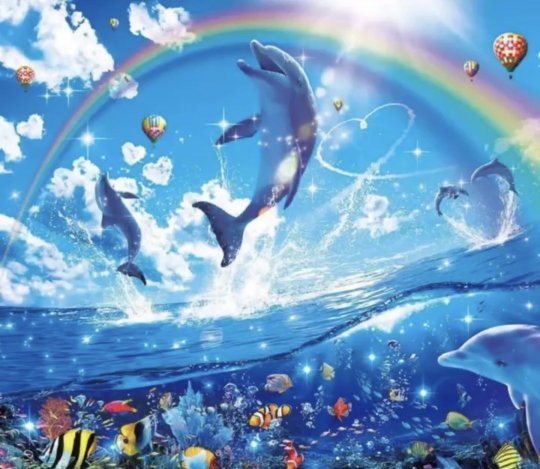
It's literally bubblegum pop at its finest. It sounds sparkly, cute, uplifting, and deceptively adorable, and anyone who has seen the choreography can attest to watching the video with a ridiculous smile on their face.
I could give high praise endlessly about this underrated early TXT Bside, but I wanted to prioritize the lyrics for this post! We're going to talk about the superficial meaning of the song before we dissect some of the more suggestive, metaphorical elements. Heads up I'll be mentioning sexual innuendos, so if that's not your cup of tea then please kindly leave.
My goal is to get you to see that, at the very least, this song is not just about eating candy. Whether or not we agree on the queer subtext is another debate, but I'm hoping this analysis post can be a lesson on interpreting figurative language and grasping inneundos.

Whenever I do analysis, I always start with the surface level face-value of what's being presented, and then I try to peel the layers and discern the underlying themes or suggested connotations based on context clues. Usually I leave out the initial face-value in my posts because it's something so obvious that it feels contradictory to present it. But it feels relevant to include for Poppin' Star. So what is the face-value meaning of the song when we look at the lyrics as a whole?
On the surface, this song appears to be about a young male protagonist who experiences a burst of emotions - dizzying warmth, sweetness, and a clouded brain - after he eats a variety of flavored candies. He states that he is not satisfied with the burst of flavor he's experiencing - now that he knows this intense feeling, he's craving more.
cr. color coded lyrics (though I'm cross referencing multiple translations and using my own knowledge of individual words and tonal conjugations to understand the song)
It doesn't take much of an analytical eye to catch the innuendo presented in Poppin' Star. What exactly is an innuendo? An innuendo is an allusive hint to something typically sexual. The keyword here is hint - it's something you pick up on based on subtly provocative language. Critics could argue that "your brain must be in the gutter" if you find sexual context where there is supposedly none. I'd say blaming the observer for a sexual interpretation is disrespectful to the art in question. Inneundos are meant to be spotted and discussed - they have the potential to heighten the art and unveil a greater message. Just because something is sexual does not mean it is bad.
Now that we have that cleared, it's pertinent to reflect on the surface value of the lyrics in contrast to the glaring inneundo jumping out at the audience. Let's look at the opening lyrics together:
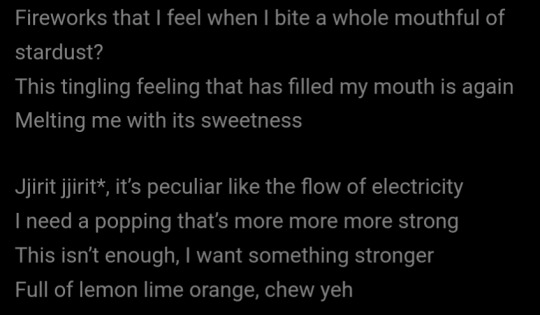
One look at the lyrics, and you'll raise your eyebrows and go, "Really? You sampled a mouthful of candy and can't stop talking about how you're tingling all over, feel dizzy, and are melting from the sweetness?" The song's lyrics and language is quite figurative: the audience is guided to see beyond the literal meaning.
If we break down the individual feelings our protagonist shares, it sounds reminiscient of a first kiss or sexual experience. Considering how strongly the lyrics center on oral pleasure (oral as in the literal sense of the mouth), the rightfully assummed metaphor here is kissing. Let's look at all the instances where the song connects pleasure to the mouth:
별가루 가득 물면 느껴지는 불꽃놀이일까? / (Is this) fireworks that I feel when I bite a whole mouthful of stardust?
입 안을 채운 콕콕 따끔한 이 느낌은 또 / This tingling feeling that has filled my mouth
혀끝에 건전지 / A battery at the tip of my tongue
Our protagonist talks extensively about the pleasure in his mouth in correlation to feeling dizzy, warm, fuzzy, electrified, and excited - all feelings heavily associated with heightened sexual experiences, and notably kissing.
A striking detail is the fact that our protagonist is not alone during the story - he's actively talking to another person, meaning he's not literally eating candy by himself and getting an explosive sugar rush as the superficial interpretation insinuates. We notice this from the opening line which calls to a direct "you":
짜릿한 정전기 you’re popping star / Electrifying static, you're popping star.
Not only is this a reference to the title, making it an important detail to note, but it's also inviting the audience into acknowledging the relevant prescence of another character, some unnamed you. He goes on to say:
머리가 띵하게 기분 좋은 my love / Making my head feel dizzy, that good feeling, my love
He's directly saying "my love," so this person is clearly special to him. This person is his popping star - someone who evokes all of these explosive, tingling feelings.
The chorus is riddled with suggestive language: "This isn't enough / I need something stronger / A chew full of lemon, lime, orange, yeah / I need more, more, more / A stronger popping / A chew full of lemon, lime, orange, yeah"
Our protagonist is craving more flavor as he seeks a pleasure high. My interpretation is that the other character is wearing flavored chaptstick, perhaps fruit-flavored or candy-flavored, and our protagonist wants to taste more of the character's lips. Another interpretation is that they're both chewing on flavored gum, and when they kiss, the flavors blend together in a satisfying burst. Both feel plausible to me. The chorus suggests a kiss through the explosive repetition of surprised "oh's" that the members sing. It's hard to explain without hearing it, so skip to 0:48 in the song to catch what I mean. The explosive instrumental paired with the high-pitched oh's feels representative of an epiphany, or at least a heightened emotional state.

Perhaps one of the most glaringly suggestive parts of the song is Beomgyu's line after the first chorus, where he says:
잠깐 쉬어갈 땐 slime vacation / When (I) take a short break, slime vacation
This implies he's taking a break from exchanging slime, or saliva, with the aforementioned "you". Keep in mind that Korean sentences don't always need an explicit subject, so it's unclear whether Beomgyu is saying "When I take a short break" or "When we take a short break". However, later in the song, during a critical moment that I'll get to shortly, Yeonjun explicitly mentions the pronoun 우리 (we/us) which means we can assume this whole candy-tasting fiasco is, at the very least, a pleasure-seeking high that our protagonist is doing with someone by his side.
The kissing metaphor is more strongly suggested when Taehyun says:
어제 했던 건 벌써 지루해 / The things that (I did/were done) yesterday are already boring
더 더 더 강한 popping이 필요해 / I need a stronger popping
which tells me the song is self-aware enough to recognize it's not just about eating candy. Why would yesterday's candy be described as "the things that were done yesterday"? I also find it interesting that he's using the verb 지루하다 instead of 심심하다 when mentioning boredom. Both of these verbs mean "to be bored", but 심심하다 refers to boredom through a lack of action, whereas 지루하다 has the connotation of being bored by something because you've been doing it for a prolonged time; as in, you're getting physically tired of it. So, Taehyun is saying that the stuff he did yesterday has become repetitive and tiring, and he's now seeking a stronger high. Very suggestive language.
There's a line from Heuningkai that really stands out towards the latter half of the song. He goes:
가끔은 조금 위험해도 돼 / Sometimes it can be a little dangerous
엄마 몰래 자물쇠를 열어봐 / Open the lock without my mom knowing
The conjugation here is very interesting!! He uses the 아/어도 되다 pattern at the end of the adjective for "dangerous", which is a conjugation used to give permission for something. So, rather than him stating the fact that it's dangerous, he's giving permission to the speaker to be a little dangerous. It's a subtle nod at him approving risky behavior, so perhaps a better translation would be "it's alright if sometimes it's a bit dangerous".
"Open the lock" reminds me of Soobin's verse in Sugar Rush Ride:
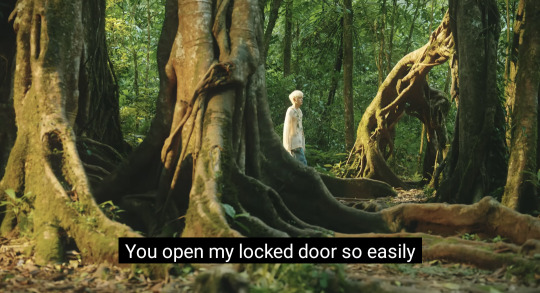
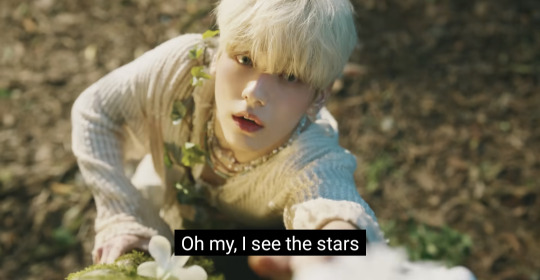
, which I interpret as a more blatantly sexual inneundo for losing one's virginity. I don't think Poppin Star implies more than kissing, but asking someone to open your lock without your mom knowing, and engaging in risky behavior, appears symbolic to doing something you wouldn't want your mom to see, so at the very least it's suggestive language.
This interpretation aligns with the direct album overview provided by Bighit, which states that "The Dream Chapter: MAGIC tells the story of 'magical adventures' that boys encounter together with their friends [...] the boys share their transformation, confusion and exploding emotions that arise during their transition to adolescence." Notice that the official statement itself says that the album centers on a boy and his friends as they transition into adolescence. Interesting.
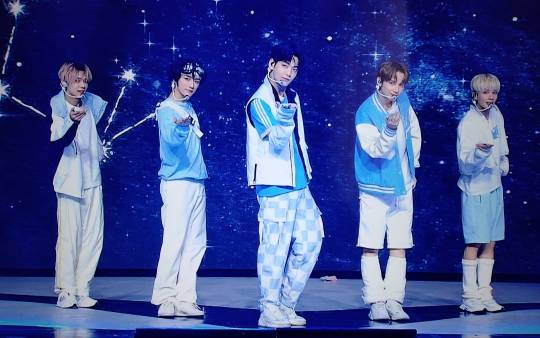
I'd be happy to leave the analysis there and say, "See? The song is clearly an innuendo", but then the writers toss in the gayest shit during the last third of the song that forces the audience to pause and reinterpret.
Yeonjun and Taehyun sing the following lines:
이건 어쩌면 나라에서 허락한 / Maybe this is something that the country has allowed
우리끼리만 숨겨둔 유일한 / Something we have kept hidden just among us
자 아무에게나 허락된 게 아냐 / Alright, it's not allowed to just anyone
입안 가득 터뜨려 / Burst a mouthful
The verb used here is 허락하다 which means to allow, permit, or approve. Talking about what your country allows in connotation to something you've kept hidden among the two of you…feels queer-coded. Especially when the rest of the song has been dedicated to pursuing a thrill from "my love", a pursuit which they acknowledge is intimately private given the line "without my mom knowing". Why bring up what's allowed in your country in a song that centers on a boy seeking pleasure? The last line is odd too - it's conjugated as a command, so our protagonist is telling us, the audience, that we should pop a mouthful of the candy too. In connection to the line above it, it's implied that he knows popping the candy aka kissing his love is not allowed for everyone, but he's encouraging others to try. Adding to the intrigue is the fact that they repeat the last two lines again, but change the command to 입안 가득 터뜨려 봐 which is a less forceful command and more like "Give it a try".
If the song truly were just about candy, talking about what your country allows and who is allowed to do it feels very out of place and strange. This, paired with the striking fixation on oral pleasure makes me believe the song is about a boy kissing his friend, and it's been a fun, exciting little secret between the two of them.
It doesn't feel like an exaggeration to find queer subtext here. If you're an avid TXT fan, you'll know their songs are very queer-coded, from 0x1=lovesong having the most blatant thematic connection (I still regularly think about Soobin's "I can't go to heaven, I don't belong there" line) alongside Sugar Rush Ride, which suggests we "swallow the sugar rush"....sir, swallow what exactly??!
I hope this could spark your interest and see the lyrics from a new perspective. Sorry not sorry if this burst your innocent perception of the song...like I said, it sounds deceptively adorable 😂 let me know your thoughts and thanks for reading!
#lyrics analysis#txt lyrics#txt poppin star#kpop discourse#tomorrow x together#yeonjun#soobin#beomgyu#taehyun#heuningkai#txt moa
49 notes
·
View notes
Text
The small detail in Anti - Curse of Julien singing "Breaking curfew with illegal fireworks" with Phoebe and "Unpacking God in the suburbs" with Lucy really gets me.
She's actively recalling very personal events that took place with her friends and they're singing with her, like a flashback coming to her mind of their faces.
42 notes
·
View notes
Text
I stg every time I listen to little evermore, I literally get legit tears in my eyes when I hear taylor sing: “I swear you were there” 🥺
The way she thought and dreamed about him (“when I was shipwrecked / I thought of you / in the cracks of light / i dreamed of you”) when everything was falling apart… “When she lay there on the ground / she dreamed of […] / a love that was really something / not just the idea of something,” and then, “when she stood […] / standing broad-shouldered next to her / was a love that was really something.” It was real enough to get her through because it wasn’t just the idea of something.
He was there.
#I literally cry#it makes me so emotional#taylor swift#joe alwyin#swiftwyn#little evermore#why she disappeared#lyrics analysis#j says
479 notes
·
View notes
Text
A deep analysis of Konstrakta's "Novo, Bolje"
I know that there are maybe many articles about this song already, considering it came out a week ago or so, but I am so in love with both the song and Konstrakta herself that I needed to put my two cents on this song and why I think it's such an awesome entry. I'm also going to make a comparison to In Corpore Sano and relate both of the songs. I hope you'll enjoy reading this as much as I enjoyed writing it.
Btw, I've gotten the necessary translations from here and here.
Let's start out with the title: Novo, Bolje means New, Better. It's already an indicator that sets the pace for what is coming.
Musically, the song is quite simple - It has only three chords that keep repeating in an uniform pattern, with a distinctive synthesizer that repeats itelf throughout the song as well. It's fast paced and eclectic, very modern, to fit the theme of the lyrics. It's worth noting that the backup singers are taking a very important function here. I'll explain it later on.
Now, let's get to the lyrics. Through the entirety of the song, Konstrakta is speaking to an imaginary doctor, to which she's telling of her latest affliction: She craves novelty. She only wants new things, new improvements, nothing seems to be enough for her, and she considers this as something wrong, something to be cured. This is about addiction to novelty and consummerism - modernity has made us addicted to updates, the newest phone, the newest device, the newest social media, every new thing is exciting and we eventually run for it.
The chorus is proof of it: New, better, faster, bigger, higher, prettier, stronger. The things she has aren't somehow enough, and she claims that all of this is coming. She wants something better than good. Good isn't cutting it anymore. It needs to be better.
Konstrakta proceeds to elaborate on her point saying that if she was smarter, she could turn a kilo of bread into two, and that ever since she was born, she has been knowing about better than good, which is another jab at modernity: New generations are addicted to new things since they are little. Let's think back, how many of us in our childhoods wished for better, bigger toys or electronic devices? It's an actual reality. And with the rise of phones, tablets and similar devices in infancies, this is more present than ever.
This also speaks about self-pressure about being better than good, the line "the performance could've been better" is a reference to our modern perfectionism, and the wish to reach even higher heights everytime, with innovations that sometimes aren't necessary. Why would the Pacific ocean need to be more pacific, anyway? The grandiosity and the exaggeration are marketing elements to draw you in, to try and show you that you can, indeed, be better than good. It's exploitation disguised as motivation and self help.
Then she says that she feels set up everywhere, because she is seeing anomalies, which is another point. Consummerism is a social issue, but if you point it out in a consummerist society, you're most likely to get laughed at or gaslighted in the sense that you're not being brainwashed by the consummerism. Which leads us to the next line, Konstrakta asks the doctor what's wrong with her, why is she seeing anomalies everywhere? Why is she addicted to novelty and perfection? She's trying to break the cycle of self-awareness, and at the same time, she wants her head to shut up about the pressure of novelty and perfectionism. She might believe nobody else is going through this, which is, ironically, an anomaly on itself.
When she sings the word "better" over and over again, it eventually gets distorted by the end of the phrase, which shows us that she's losing herself. In trying so hard to reach better, to improve, she's losing and destroying pieces of herself to try and build something new. The backup singers are repeating the other adjectives: better, faster, bigger, higher, prettier, stronger. Another proof that her head presses her further than she can actually reach.
In a more calm section of the song, she says that everything is fluid, and if she stops, she'll fall through, stating that she needs to constantly go full speed, up, towards higher heights. This is very telling. At the beginning of the section, the music gets calmer, almost quiet, but as Konstrakta starts repeating the words "going up, constantly going up", the synthetizers and the fast pace are back again, supporting her claim and her "illness" - the need for speed, novelty, perfection. Nothing is enough. Nothing will ever be enough. Konstrakta is trapped on a cycle of perfectionism and addiction to novelty. In trying to break the cycle, she's perpetuating it at the same time. It's a vicious cycle from where she can't escape.
When Konstrakta asks again what's wrong with her, this time she doesn't even get to explain what affects her. Here is where the backup singers reveal their real role: They are the voice of society. While Konstrakta tries to figure herself out, the singers appear to reinforce her need for novelty, the need for something new coming, the thought that nothing is never and will never be enough. And in this final section of the song, they shut Konstrakta up: "For God's sake, there's nothing wrong with you". They're gaslighting Konstrakta into thinking it's all in her head, and that she needs to keep striving for more.
During the final section of the song, the singers chant, almost like madness, that it's coming. Novelty and progress are coming, and nobody, not even Konstrakta herself, can stop it. While all of this is happening, she screams, calls out for the doctor to help her, but she receives no help - she's being consumed by the spiral. She's being dragged by the tsunami of society, the fast paace of consummerism devouring her as she screams in agony. And then, she says the most beautiful phrase I've seen in a song in a while:
"The wish doesn't know about what is unreachable."
We can strive and wish for perfection all we want, but wanting something and being realistic about it are two completely different things. We can try to reach the moon, but we are too far to actually do it. And in our search for perfection, not only can we lose ourselves, but we can go to dangerous heights: Security breaches, the end of individual liberties, violence, stepping over people's heads to get whatever we want, however we want. The wish doesn't know what's unreacheable. Therefore, there are no limits to modernity. This is a hurricane, and it's going to destroy us all.
There is no escaping this. Which is why she closes by saying "it's coming" - Modernity is coming. We can't do anything to stop it.
Now, let me compare this masterpiece to her former Eurovision entry, In Corpore Sano.
It's curious to notice that both songs have the same length. In Corpore Sano, in case you need a reminder, speaks about how an artist must keep themselves healthy, appreciating our health and the moments in which we have it, to be thankful for being healthy and our body properly functioning. It's a jab at the Serbian medical system for it's negiglence with artists and the lack of medical insurance for them, also stating how health is a privilege, citing Meghan Markle's hair as an example to kick off the song and start speaking about hydration and health problems and how to identify them.
A healthy mind in a healthy body, a sick mind, a scared mind... Where do we go from this?
This song is more ominous, and the beautiful staging was also very ominous, setting the atmosphere for Konstrakta to become an advocate for Serbian artists and their health system. Art and social criticism, hand in hand.
Both In Corpore Sano and Novo, Bolje speak about health, one being physical, the other being mental. In the case of In Corpore Sano, the background singers don't take as big of a role as they do in Novo, Bolje, and when they do, they reinforce Konstrakta's message, instead of being dismissive about it or trying to shut it down. Both the songs are written in minor keys and are limited to a couple chords, keeping it simple.
In Corpore Sano is slower paced, as if trying to get people to understand the point. We also get a hint of grief - Konstrakta lost her bandmate and friend Miroslav Ničić to leukemia in 2019, which inspired this song to come to fruition. Novo, Bolje, is faster paced, showing us the chaos and the need to rush that the song tried to criticize, and it's repetitive, highly repetitive, to catch people in. The catchy tune is meant to make you forget the point of the song, showcasing how tone deaf society can be sometimes.
At the same time, In Corpore Sano has a hint of divinity. God grants us health, but I don't have medical insurance. Latin has always been a language related to holiness, to purity. Novo, Bolje, has no divinity to it, it's quite banal, vulgar if we try to compare it to Latin - in the Middle Ages, any language that wasn't Latin was called vulgar, meaning "of the people". This song is nowhere near God. Our society has killed God, and has gone beyond divinity. Holy Modernity, mother of our Society, has taken over.
In Corpore Sano is meant to be a ritual song in all of its aspects - we see Konstrakta moving and clapping her hands, cleaning them ritually with her backup singers as assistants, overseeing the process as if to take care of her. They are dressed in black, Konstrakta in white, showing herself as a pure, healthy being, trying to teach others about health and how to keep it. We haven't seen anything about Novo, Bolje's staging, but the concept Konstrakta has shown with her in blue skin and an eccentric white attire, with the caption "The Kilimanjaro could be higher" (a brilliant reference), is meant to scandalize, to be weird, to make you think about the absurdity of things. Again, there is no holiness, no ritualism, nothing. It's banal. It's empty. And that banality, along with the message, is what makes this whole concept beautiful on itself. It's what makes it so brilliant and so well crafted.
I hope you've made it so far and that you have liked this analysis. In short, Konstrakta is a genius, a musical and lyrical genius, and I can't wait to see her again setting foot on Eurovision's stage. I hope this helps you look at her song with new eyes.
She's definetely gotten newer and better.
---
I'm adding a new section of this analysis, to further it, now that Novo, Bolje's staging has been revealed.
First off, I want to thank every single one of you who gave support to the original version of the analysis, from the fans, to people from Serbia, to Konstrakta herself! I'm super honored to have been shared and promoted by her. It feels amazing.
Now, onto what's important: The staging.
Many people have put criticism on the fact that "this is just the same as last time", but they fail to perceive this is the exact message Konstrakta wants to get across. Modernity promises new, better, bigger, stronger, faster, prettier... But in the end most of the things that it produces are the same that they were before. Many new phones end up being the exact same as old models, but with a very small improvement, sometimes hard to see. This is the reason why Novo, Bolje is so similar to it's eldest sister, In Corpore Sano. A sequel that doesn't feel as much as a sequel, and in there resides its charm.
I've also been pointed out to the fact that this is supposed to be a satire against returning artists and their efforts to make something "new, better", and I really like that approach. It's a very interesting artistic satire.
Konstrakta is once again dressed in white, and her singers in black - A contrast between divinity and evil. But this also reinforces the fact that she is the "odd one out", she's questioning modernity, she's the one going against the norm. She's different from everyone around her. The fact that we can't ever see the "doctor" she's referring to, also helps reinforce this message. This will come back later, so keep it in mind.
This time around, she is not washing her hands, but instead making bread. Bread has many symbolisms, but in religion, bread symbolizes the gift to God to humankind - a stark contrast to a godless modernity, as stated prior in this analysis. Bread is the most basic of meals, and one of the easiest to put together, it's universal, every culture has its own version of bread. Just like modernity, universal, basic, stripped out of all value when you truly look into it. Bread is one of humanity's turning points. Modernity is, too, one of humanity's turning points. The creation of the Internet, the introduction of cellphones and computers, the invention of social media, didn't they all change humanity as we know it, just like bread did? Also, just like bread, these novelties are "food" - a basic need, something we can't live without now that we have discovered it.
Interestingly enough, the words "Not new, not better" flash around the first minutes of the song. This "episode" is so similar to the past one, it seems to contradict its title, but then again, therein lies its charm.
In the background, we always see eyes on the sides of the stage. "Big brother is watching you" - rings a bell? Modernity has its eyes everywhere. You are constantly being watched, you have to keep on track, not question anything and just lift your head and pretend everything is normal.
Konstrakta is constantly kneading the dough, never do we see her putting it into the oven - this can also make a reference to the "it's coming" line of her song. The bread is coming, it's supposed to come out soon, just as novelty is coming. Evo sa'ce, how the song would say. Inbetween, Konstrakta lets the dough rest, covered. Anyone who's made bread or seen a bread recipe, know that this is so the dough rises up. Just like a further section of the song, rising up, constantly up. If we tie this to the political meaning I've seen people add to the song, this could also double up as the gestation of an uprising against politicians, or even the fake promises they make.
During the first part, her backup singers are huddled in a corner, and from there they scream at her "it's not enough". This is a perfect parallel to what I put in the first half of the analysis, about self-pressure, perfectionism and how they play a big part on modernity's declining mental health crisis.
In one part, Konstrakta uncovers the dough and just stares at it, along with her backup singers. They all stay there, perfectly still, like Mary watching Jesus in many religious imagery. They stay so still one wonders if something's really happening. As this section ends, a gate opens behind her as she adresses the "doctor", showing a white glow. This is the only time we get that the "doctor" is not really there, it's more like a self-reflection device. And this, once again, symbolizes the divinity amongst the profanity. Holy Modernity, mother of society. Once this happens, Konstrakta goes back to kneeading the bread. It's in the part where she talks about the need to go constantly up, putting up self-pressure and the anxiety of not being perceived as a perfect, functioning piece of society. It's a brilliant parallel.
As that section goes on, we can see one of her backup singers wave their white cloth around. The others stay perfectly still. This is also a symbolism of being the odd one out, how the one that's anxious and constantly on the grind is also frowned upon in some sense.
After the section where the singers tell Konstrakta to calm down, they start circling her while she keeps up her work. It becomes erratic and chaotic, just exactly as I had pictured in my head. Ultimately, Konstrakta is left alone on stage. Covering the dough once more, she claims "it's coming". The bread is coming. Modernity is coming. "Food" is coming.
I'm once again fascinated, throughly fascinated and thrilled by this woman's thought process. As I write this, I got the news she made it into the final! I'm so happy for her. March 3rd, I turn 26 years old. And it'd be the greatest early gift to see her win.
This was, indeed, new, better, and brilliant.
#konstrakta#novobolje#analysis#lyrics analysis#serbia#eurovision#pze#I love Konstrakta with all my being#This woman is a genius#I spent a solid half hour working on this listening to Novo Bolje on a loop#I really hope she wins#Novo bolje
22 notes
·
View notes
Text
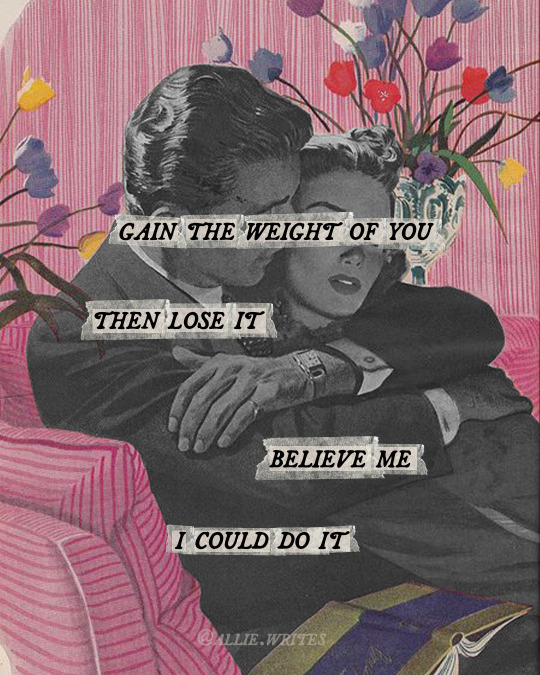
The song begins with "I sit and watch you", followed by her thought process while watching her lover read.
She’s wondering why she's doing all these things and they're still not good enough for him. Then she’s asking him in her head, "If I left, would it matter to you? Believe me, I could do it." And yet the song ends with the same line: "I sit and watch you."
She wants to leave him, but she cannot do it.
(IG: @allie.writes)
#tolerate it#evermore#taylor swift lyric edits#taylor swift lyrics#taylor swift#taylor swift songs#taylor lyrics#taylor swift quotes#writing#taylor swift writing#taylors version#taylurking#lyrics aesthetics#lyrics art#lyrics quotes#lyrics edit#lyrics analysis#harry styles#joe alwyn#all too well#digital art#collage art#artist#graphic design
729 notes
·
View notes
Text
EE Lyrics Study: teeth/bones/nails


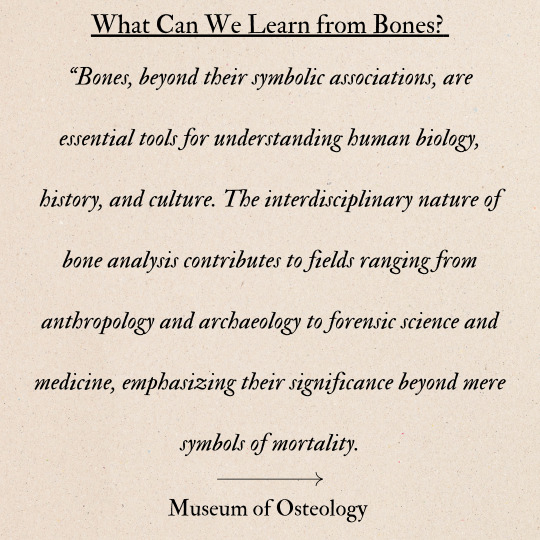
Hello! This is my first "lyric study" for the band Everything Everything and the topic is: BONES/TEETH/NAILS.
Basically, when listening to their music, I kept noticing words related to this topic and I was curious if the topic actually existed across their discography. I marked every lyric that included key words:
bone, skull, teeth, vertebrae, fossil, etc.
I did a little research to see the cultural significance or any other meaning/symbolism of these words. I didn't want to dive too much into the actual meaning of the lyrics*** or the greater context of the song, but instead looked at the overall patterns of the key words.
I notice that in EE's lyrics, bones/teeth are mostly used to evoke images of graphic things being done to a body or to liken humans to other animals/creatures. There's mentions of bones both inside a living human and in someone/something that's dead.
Personally, I interpret these uses as a more shocking or uncomfortable way to refer to those parts of the body (e.g. teeth instead of smile, clavicle instead of collar, skull instead of head), which is pretty on-brand for EE's provocative lyrics/themes.
And half the street was under my nails -MY KZ, UR BF
Cos even now, there's a bone snapping -Leave the Engine Room
My teeth dazzle like an igloo wall, I inhabit, I inhibit ya'll -Photoshop Handsome
But right above my clavicle, the world becomes so laughably old -Wizard Talk
Teeth and nails your little anatomy -Luddites and Lambs
Past-tense -- what's a trilobite to anyone? -Kemosabe (marked because it only exists in fossil form)
Coiled heart, eye-tooth, feral child -Torso of the Week
And cloudy with potential, muscle mass and vertebrae begin... -Choice Mountain
While Princes fly drones that can see through your bones - Undrowned
The street is a boneyard she glances -Armourland
And now who's the fossil who gets the girl? -The House is Dust
Bic your head and show your teeth to them honey -Don't Try
And sweat runs up his neck and spine -Awe/Arc
You take the poleaxe out of your spine, push your shoulder back in its place -A.D.
Canine, fangs up out my throat -Distant Past
Teeth on a wire -Get to Heaven
Swing the hammer, the fragments, a skull exploding -Spring/Sun/Winter/Dread
Bone, to the blade -The Wheel is Turning Now
Bones in a bowl like a toad-in-the-hole, take the shape out of the mould -No Reptiles
And your spine is a glass spire -President Heartbeat
I can feel my bones screaming out -Yuppie Supper
Yet the concrete burns at the back of your skull -Night of the Long Knives
I'm just a knuckle dragger with a knuckle dragger grin -Desire
If my bones just fall away -Good Shot, Good Soldier
Skeleton boy with the skeleton girl souvenir -Big Climb
As fresh as my bouncing bones -Arch Enemy
The bones snap into place -Black Hyena
Stretching my lips over my teeth -SUPERNORMAL
I want the teeth of the enchanter - I Want A Love Like This
Drinking from a hollow skull -Cut UP!
But the seed inside your skull is now a watermelon -HEX
You can sing you can play my ribcage like piano -My Computer
***I feel like we'll never know exactly what Jonathan means when he writes (lol seems like he doesn't know sometimes either) so I didn't want to get caught up in guessing what he meant. I find it tiring to try to figure out 'why did he say that?' and instead just enjoy and find my own meaning :)
#everything everything#everything everything band#ee#e_e_#e e#ee lyrics#man alive album#arc album#get to heaven album#a fever dream album#reanimator album#raw data feel album#lyrics study#lyrics analysis
16 notes
·
View notes
Text
They’re Suburban legends because she turned their lives info folklore:
“My mind turns your life into folklore”
- Gold rush
“We were born to be suburban legends […]”
- Suburban legends
Suburban legends = stories and gossip that go around in little towns.
Folklore = stories passed through the generations by word of mouth.
#taylor swift#taylor swift lyrics#lyrics analysis#lyrics parallels#suburban legends#folklore#gold rush#evermore#1989 taylor's version#lyrics
29 notes
·
View notes
Text
Ugh now I’m thinking about the evolution of the topic of marriage/commitment over the years
I take this magnetic force of a man to be my lover -> I’d marry you with paper rings -> one single thread of gold tied me to you -> give you my wild, give you a child -> are you really going to talk about timing in times like these? -> all they keep asking me is if I’m going to be your bride -> I wouldn’t marry me either -> do something babe, say something -> you’re losing me
#Taylor swift#you’re losing me#lyrics analysis#writing letters addressed to the fire#ugh it’s like the evolution of a relationship in lyric form#I’d also add the part from it’s nice to have a friend#Church bells ring carry me home / Rice on the ground looks like snow#which I always thought was wedding imagery/metaphor for them#(as in this is where the story of it’s nice to have a friend would end)#but I don’t know if that’s an accepted reading of it#also I will always always be convinced the single thread of gold tied me to you line meant marriage#so that’s why I’m including it#it’s too strong of a metaphor for a wedding band to me to be ignored
144 notes
·
View notes
Text
Would that I by Hozier but make it Merthur in the last episode
I didn’t have time to do line by line analysis so it’s more of an overview, but go look up the lyrics and you’ll see what I mean.
The song is about finding new love and old relationship troubles, as the trees in the song, are burned down by the new love, the fire. That’s literally Arthur learning about magic and what it is for Merlin. He learns about this huge thing and accepts it, then all the lies and every idiosyncratic thing he’s never understood about Merlin falls into place and it makes sense because of the magic, without disregarding every other aspect of his person.
-“That the sound of the saw must be known by the tree” when Arthur asks Merlin why he risked so much knowing that magic was punishable by death.
-“oh but you’re good to me” is Arthur realising how much Merlin has done for him.
-a lot of mentions of fire, Arthur seeing gold in Merlin’s eyes, “Amber of ember glows” do I really need to say anything more?
-“it’s not tonight where I’m set alight” Arthur being relieved or whatever you want to call it about Merlin still being Merlin, still drying his boots, helping him to eat. He’s still the same, just Merlin and magic now.
#bbc merlin#merthur#hozier#would that i#arthur pendragon#merlin emrys#merlin#lyrics#lyrics analysis#i’m bad at tagging#diamond of the day#i’m sure i’m forgetting a few tags here but i’m tired so it’s fine
40 notes
·
View notes
Text
Quick, first impression analysis of Hozier's "Wildflower and Barley" from the new EP
Springtime in the country
Each time, I'm shocked by the light
The world lying fallow
And you are apart from me
Everything in my vision is movement and life
Riverboat, wheelbarrow, wildflower and barley
“The world lying fallow” - fallow can mean “characterized by inaction; unproductive” but also it can mean “plowed and harrowed but left unsown for a period in order to restore its fertility as part of a crop rotation or to avoid surplus production”. I find that I like the second definition more because in covid times, that’s what happened (although it wasn’t planned). For example, the sea animals were coming back to the canals in Italy because the water was healing. Nature was healing. Though the world was unproductive, life isn’t necessarily synonymous to productivity like how we as humans have been led to believe. Your life isn’t characterized by what you do because life is an innate quality.
Though life at that time was in a state of limbo, life moves on (aka the last line). It's interesting that this is set in the springtime specifically because spring is the month of renewal. After the months of winter where nature is basically taking a break from any sort of growth and all growth has been stopped, spring and it's rays of light that are contrasted from the darker, cloudy winter days is a ray of hope and the start of renewal.
Springtime in the country
I can smell summer on its breath
Low and harrowed lie the fields and the heart of me
Everything in my vision, departure and death
Riverboat, wheelbarrow, wildflower and barley
This stanza plays on the first one because it’s practically the same lines yet it has substituted the speaker’s vision of life by death. However, the line about departure and death is followed by the same line that was to describe movement and life. Though there is death and departure, life moves on. The riverboats keep moving down the river, the wheelbarrow keeps rolling along, wildflowers always bloom in spring, barley grows into food for sustenance (to keep life living).
The fields are low and harrowed, waiting uneasily for action and the cultivation of food are exactly like his heart because he is waiting without a deadline for the time in which he can live life freely and love you again.
(The healers)
This year, I swear it will be buried in actions
(Are healing)
This year, I swear it will be buried in words
(The diggers are digging the earth)
Some close to the surface, some close to the casket
(I feel as useful as dirt) Useful as dirt
Put my body to work
Mmm (Ooh)
Mmm (Ooh)
Whenever Hozier sings a song w another person I love the way in which he mixes two different storylines in the chorus (damage gets done). What is being buried in actions? What’s being buried in words? What is close to the surface and also close to the casket? Idk. It’s gone a little bit over my head. If I had to guess, I think he’s making a big metaphor from humans to plants (omg wow has he ever before done this like ever?).
(For these next two paragraphs ignore the parenthesized lines in the chorus) (first line = “this year, I swear it will be buried in actions)
Plant- first two lines (seeds of growth buried underground), third line (some close to breaking out into the world, some not budding at all), fourth line (though dirt is useful because it is the environment of the seed, the seed itself is useful because it is the thing that grows) fifth line (seed is put to work to renew life)
Human- first two lines (we are going to be doing things, we are going to be speaking, we are going to be living, though not productive, the mere act of living and just doing things regardless of impact is action and words and ultimately us living life) third line (some are close to making it out of the year and able to break out and do something greater, some die) fourth line (we are as useful to the world and the continuation of life as the environment outside of us, we are the ones that facilitate the growth of the plants and life in the dirt that holds the life we create in it) fifth line (I’m going to put my body to work and because we are innately full of life just by being alive, living and dying regardless of what happens to us is continuing life and renewing life)
“The healers are healing” and “the diggers are digging” are interesting because I have found both a straightforward meaning and a more creative one. “Healers” line could literally mean people are healing from covid and “diggers” line could literally mean people are farming. Also, “healers” line could mean people are participating in the continuation of life by healing others but people are also participating in the continuation of life by digging people’s graves when they die. Though dying seems like the end of life and the antithesis of life, it contributes to the duality of life and therefore a part of life.
I don't have much to say initially about the rest of the song because although there are little changes here and there, there isn't anything significant. But, I do want to talk more about the song as a whole. I hadn't read Inferno or known anything about the circles of hell but I did do a bit of research when I found out this was inspired by the first circle aka limbo. It’s oftentimes described as “a place of sorrow without torment” and that’s how the he's experiencing the world around him. I think when I first read this, I was so confused with the tone it was trying to convey (whether it was optimistic or pessimistic) because one line would be like “life persists” and the next will be like “we’re surrounded by death” but it makes sense to erase the idea of a one sided view of life and make room for the infinite shades. There can be space for two things at once. In the first circle of hell, the people that are in it are the unbaptized and the virtuous pagans. These people were good, they didn’t sin, yet they aren’t able to reach heaven because of the circumstances they have given. It is a lonely, forever existence and though it isn't heaven, it isn't hell. Life is sort of like that because though life comes with the pain of death and sorrow, it also comes with the renewal of life and death is simply a part of this cycle. I was just about to write the next sentence to be something like “therefore, we should be grateful for life and ourselves” but I think this is the wrong statement to write for this song because this song I feel lacks judgement. Like how limbo feels like a vague void of opposing forces yet the combination of those, it is less talking about the human condition through the lens of “what’s right” or “what’s wrong” and it’s more holding up a mirror to life and nonexistence of singularity. But even though there is no single human and natural story, there is one constant which is renewal and the innate continuation of life. Our death is life and our life is death.
Please let me know what you think about this song because I'm frankly obsessed and my head is spinning because this song honestly feels the most obscure to me in meaning compared to the other three on the EP.
#hozier#analysis#hozier lyrics#hozier music#unreal unearth#lyrics analysis#literature#literary analysis#wildflower and barley#andrew hozier byrne#unheard#allison russell
16 notes
·
View notes
Text
more lyrics I like from the french musical. these are from 'J'avais rêvé d'une autre vie' a.k.a. I Dreamed a Dream (this is not including the very first verse, but starts at the point where she starts singing 'for real', if that makes sense).

Translation
I was so young, where is the harm?
I wanted to laugh,
To love and to live,
Dance until the end of the ball
Drunk on the merriment of being free.
But the wolves prowl at night
And one of them was on my trail
Me, I satisfied the appetite
Of the first thief who passes.
He accustomed my life
To the warmth of his presence
And then one day he was gone
Having stolen my childhood.
Sometimes I still dream of him
He begs me and he regrets
But the dream is extinguished at dawn
Like the lanterns of a festive evening.
--
I like the slight defensiveness she shows at the start, with 'I was so young, where is the harm?'
It reminds me of that post about how Brick Fantine is naïve and makes some bad choices, because she's young and literally has no one to look out for her, but she is still treated sympathetically in the narrative (if not within society).
I also like how we get wolves here instead of tigers (idk the tigers always seemed a bit random to me), and that Tholomyès is then also compared to a wolf.
And finally, the closing lines create a beautiful image that ties back to the first stanza.
#idk if anyone else finds this interesting at all but anyway#fantine#i dreamed a dream#les mis musical#les mis lyrics#les mis adaptations#lyrics analysis#les mis français#les mis#les miserables#les misérables#sylvie's own nonsense
27 notes
·
View notes
Text
Random thoughts on We're in Love (or "Your average Italian girl has had an awful week and Boygenius' love saves her ass again"):
So, I've been listening to the Boys and to their solo stuff the whole week (for the past 5 months, to be honest... but who's counting?) and I've been going crazy lately for the beauty of We're in Love.
I think we can all acknowledge that that song is one of the greatest songs in "The Record" and one of the best ever written. And then I started bawling, when my mind got stuck on its lyrics and realised just how heartbreaking and beautiful it is.
This will be kind of my personal analysis (also inspired by some suggestions here and there... thank you to all the geniuses around that have noticed certain things. I wish I could write down all your names, but my memory is awful), so if you disagree with it or feel the need to add something, do it. I'd be happy to meet more Boygenius fans!
Ok, I'd like to begin with the third and fourth line of the first verse, where Lucy sings: "I don't need the symbol of a scar/ So put down the knife, we're not swapping blood". And yet, in "The film", Julien still takes a blood oath with the young versions of Lucy and Phoebe. I think that this was such an interesting choice to make, considering the difference between the words and the actions. This actually makes sense though, when underlining that 20$ is Julien's song and these words belong to Lucy.
Julien, as her solo albums readily witness, has no real problem with hurting herself ('Cause I'm so good at hurting myself - Brittle Boned) both physically and psychologically. We also know, from 20$, that she does believe in being connected to Phoebe and Lucy in every universe or life (In another life we were arsonists). Lucy does too with them (And I told you of your past lives; In the next one [life], will you find me? - We're in Love). Same goes for Phoebe, even though it's a little more subtle with her. In fact, more than believing in other lives, she seems to believe in changing herself in the present life, so much that, even though Emily I'm Sorry is her song, she has decided to sing it with her best friends, because, maybe, she'd rather be someone that can be loved by them in particular and not someone only Emily "could want".
To better understand the scar line/imagery, I think it important to notice that Julien doesn't take the blood oath with her adult friends but with their younger selves. In my opinion, it's like a machine has brought them in Julien's universe or timeline to help her get out of her home, which, listening to her music, is a synonym of recovery or at least of a better state of mind (in Go Home and Please Stay, it is quite clear: "I wanna go home, I'm sick", while in Graceland Too she finally gets out once she's feeling better). But, not belonging there (and we know they don't thanks to Julien's surprised expression when she sees little Phoebe), pehaps she's afraid that she'll lose them once they're done with the car, therefore asking them to do that oath. Childhood scars never fully leave us, so Julien might be convinced that it'll help adult Phoebe and Lucy to remember her, once they meet as intended or hoped.
When you think about it, the layers here are so many that it's scary. Scars have always at least a touch of negativity, even when you get them for something not negative per se (I have so many scars I got from running around as a child...), because they always follow pain. Julien and Phoebe have dealt with it their whole life and have actively put themselves through it more than once, so of course Julien chooses to use a knife (which also brings us back again to Please Stay: "The hunting knife you kept by your bed". I don't think the mention in We're in Love is a coincidence) against herself if it means being sure Phoebe and Lucy know it's her. But Lucy stops her for two main reasons:
Julien won't have to wait for them to find her, because she and Phoebe will, according to Lucy, be the ones going to her, if they want to (Will you find me?);
Instead of remembering each other through something painful, they could use the happy and positive memories they've shared in this life. Lucy once again wants to do everything in her power to dismantle her friends' self-destructive tendencies and replace them with something good (even the "happy" in Letter to an Old Poet was her suggestion).
Moving on to the next lines (Isn't it enough that we stripped down to our skin?/ Cold and porcelain like bathers in a painting), the beauty of this specific portrait delivered by Lucy kind of proves the point just made. Saying that the skin is "cold" and "porcelain" delivers a poetic image of extreme fragility that could be both literal or figurative and it shows just how much they trust each other. What Lucy appears to be pointing out is that she doesn't need any more pain to believe they're in love with each other, since they've already done the great sacrifice of showing themselves when they were most vulnerable (something they're still learning to do, according to recent interviews).
In Lucy's specific case (And I told you of your past lives, every man you've ever been/ It wasn't flattering, but you listened like it mattered), I'd go as far as to think that she did that by letting Phoebe and Julien listen to the stories of her past friendships or even relationships, telling them whom she had had by her side before them. She sings that that tale wasn't flattering: why? If I had to express myself on that, I'd guess, by her albums, that, just like any other human being, even Lucy has had a lot of troubled bonds with people she might have wrongly thought were as true and loyal to her as the Boys are now (take Strange Torpedo, Nonbeliever or Brando as examples). My personal take on this part is that she hasn't tried to tell Phoebe and Julien who they've been in the past, but to confess them who had had their roles in her life previously, feeling perhaps embarassed by it. But they're in no way bored or mad at her for that, listening, however, "like it mattered" (quoting True Blue: "It doesn't matter anymore", 'cause they're together now, but it is still important to her that they are paying attention to this part of her story).
She also admits being open to them about her own insecurities, especially the fear of being or seeming crazy (I feel crazy in ways I never say/ Will you still love me if it turns out I'm insane?/ I know what you'll say, but it helps to hear you say it anyway), making herself vulnerable by exposing this side of her she usually keeps hidden in hope of being reassured by them, which they've probably done a thousand times already.
Long story short, coming to the end of the first chorus: Lucy loves and values them for the trust they've put in each other and no scar will ever match that feeling. I have a lot more to say about the rest of the song, but this is mostly me ranting about it, so I'll see how it goes. Sorry for all of this :P
33 notes
·
View notes